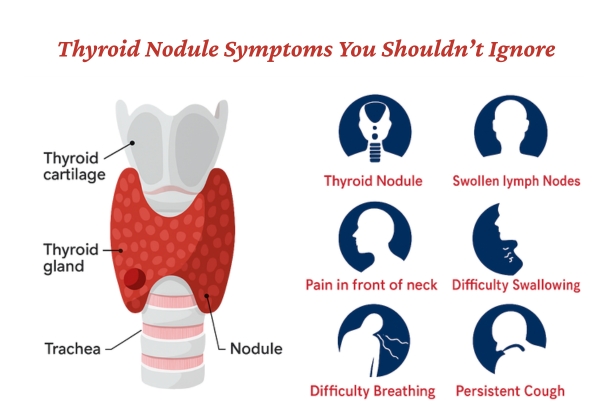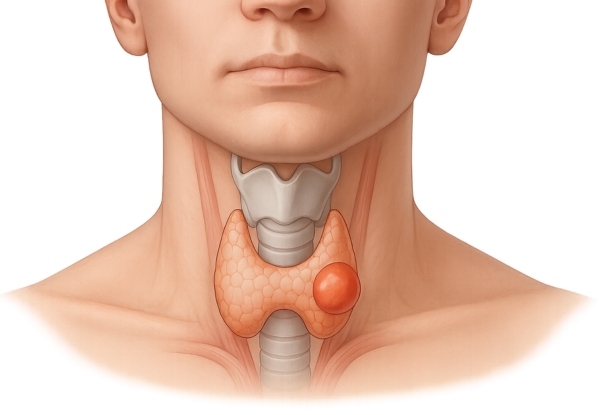
Understanding Thyroid Nodules
A thyroid nodule is a distinct lump that develops within the thyroid gland, located at the front of the neck. The thyroid is a butterfly-shaped gland responsible for producing hormones that regulate metabolism, growth, and body functions. Nodules may form due to various reasons, ranging from simple overgrowth of thyroid tissue to cyst formation, inflammation, or even malignancy in rare cases.
Thyroid nodules are common, and their incidence increases with age. In most cases, they are benign and may not cause any noticeable symptoms. However, some nodules can become symptomatic, interfere with thyroid function, or indicate underlying pathology.
How Common Are Thyroid Nodules?
- Thyroid nodules are detected in approximately 30–50% of adults during ultrasound examinations.
- Women are more prone to develop thyroid nodules compared to men.
- The likelihood of developing a thyroid nodule increases with age and exposure to environmental risk factors such as radiation.
Causes and Risk Factors for Thyroid Nodules

Understanding the causes of thyroid nodules helps in anticipating potential risks. Common factors contributing to the development of nodules include
- Iodine Deficiency: A major factor in regions with low dietary iodine intake.
- Thyroiditis: Inflammatory conditions like Hashimoto’s thyroiditis may lead to nodule formation.
- Genetic Factors: A family history of thyroid nodules or cancer can increase the risk.
- Radiation Exposure: Prior exposure to radiation in the head or neck region.
- Benign Growths: Overgrowth of normal thyroid tissue can form colloid nodules.
Symptoms of Thyroid Nodules You Should Not Ignore
While many thyroid nodules remain silent, certain symptoms indicate the need for medical attention. Patients experiencing these symptoms are advised to undergo a thorough thyroid evaluation.
- Visible Lump in the Neck
- A noticeable swelling at the front of the neck that moves while swallowing may indicate a thyroid nodule.
- A noticeable swelling at the front of the neck that moves while swallowing may indicate a thyroid nodule.
- Progressive Neck Swelling
- An enlarging mass over time, especially if it grows rapidly.
- An enlarging mass over time, especially if it grows rapidly.
- Difficulty in Swallowing
- A thyroid nodule pressing on the food pipe can make swallowing challenging or uncomfortable.
- A thyroid nodule pressing on the food pipe can make swallowing challenging or uncomfortable.
- Breathing Difficulty
- Larger nodules may compress the trachea, causing breathing discomfort, especially when lying flat.
- Larger nodules may compress the trachea, causing breathing discomfort, especially when lying flat.
- Hoarseness or Voice Changes
- Involvement of the recurrent laryngeal nerve may alter voice quality.
- Involvement of the recurrent laryngeal nerve may alter voice quality.
- Persistent Throat Discomfort
- A chronic sensation of a lump or irritation in the throat.
- A chronic sensation of a lump or irritation in the throat.
- Unexplained Cough
- A cough without signs of respiratory infection, possibly due to pressure effects of a nodule.
- A cough without signs of respiratory infection, possibly due to pressure effects of a nodule.
- Neck Pain
- Occasional pain radiating to the jaw or ear, though less common.
- Occasional pain radiating to the jaw or ear, though less common.
- Rapidly Growing Lump
- A sudden increase in size warrants urgent medical evaluation.
- A sudden increase in size warrants urgent medical evaluation.
- Palpitations
- Overactive thyroid nodules may cause irregular or rapid heartbeats.
- Overactive thyroid nodules may cause irregular or rapid heartbeats.
- Unintentional Weight Loss
- An indication of hyperthyroidism caused by functioning nodules.
- An indication of hyperthyroidism caused by functioning nodules.
- Excessive Sweating or Heat Intolerance
- Common signs of increased thyroid hormone activity.
- Common signs of increased thyroid hormone activity.
- Fatigue or Weakness
- Both overactive and underactive thyroid conditions can lead to persistent tiredness.
- Both overactive and underactive thyroid conditions can lead to persistent tiredness.
- Nervousness or Anxiety
- Hormonal imbalances are linked to thyroid activity.
- Hormonal imbalances are linked to thyroid activity.
- Changes in Bowel Habits
- Increased bowel movements may occur with hyperthyroidism caused by a functioning nodule.
When Should You Seek Medical Evaluation?
It is advisable to consult a healthcare provider when:
- You notice a new lump or swelling in the neck.
- A known thyroid nodule increases in size.
- You experience any of the symptoms listed above.
- You have a family history of thyroid disease or cancer.
- You have a history of radiation exposure to the head or neck.
Diagnosis of Thyroid Nodules
Accurate diagnosis is crucial in determining whether a thyroid nodule is benign or requires treatment.
Evaluation methods include:
- Clinical Examination: Physical assessment of the thyroid gland for size, consistency, and movement.
- Ultrasound Imaging: The most reliable tool to assess the size, structure, and characteristics of the nodule.
- Fine-Needle Aspiration Biopsy (FNAC): A minimally invasive procedure to collect cells for cytological examination.
- Thyroid Function Tests: Blood tests to measure thyroid hormone levels.
- Thyroid Scan (Scintigraphy): To evaluate the activity of the thyroid nodule in selected cases.
The diagnostic accuracy is significantly enhanced when performed at the best diagnostic center in Vasai, known for comprehensive thyroid evaluation under the guidance of Dr. Chandrakant, a respected name in endocrine diagnostics.
What are the Non-Surgical Treatment Options for Thyroid Nodules?
Modern medicine offers several non-surgical interventions for the treatment of benign thyroid nodules, especially when they are symptomatic or cosmetically concerning.
Radiofrequency Ablation (RFA)
- A non-invasive procedure that uses heat generated by radiofrequency waves to shrink thyroid nodules.
- Performed under local anesthesia with ultrasound guidance.
- Suitable for patients with benign solid nodules causing symptoms or cosmetic issues.
Ethanol Ablation Therapy
- It involves injecting ethanol into cystic thyroid nodules to reduce their size.
- Particularly effective for fluid-filled nodules.
Thyroid Hormone Suppression Therapy
- Use of levothyroxine to potentially reduce nodule size in select cases.
- Requires careful monitoring to avoid thyroid dysfunction.
Observation and Regular Monitoring
- Appropriate for small, benign, asymptomatic nodules.
- Regular follow-up with ultrasound and clinical evaluation.
These treatments are commonly provided by experienced professionals at Midas Care Clinic, with diagnostic support from centers of excellence such as the best diagnostic center in Vasai, where Dr. Chandrakant ensures accurate evaluation before treatment begins.
Benefits of Non-Surgical Treatments for Thyroid Nodules
Patients considering non-surgical treatments can expect the following advantages:
- Minimally Invasive: Reduced need for hospital admission or surgery.
- Low Complication Risk: Less risk compared to surgical procedures.
- Short Recovery Period: Most patients resume normal activities within 24–48 hours.
- Cost-Effective: More affordable than traditional thyroid surgery.
- Preservation of Thyroid Function: Minimizes the risk of needing lifelong thyroid hormone therapy.
The Role of Expert Diagnosis and Specialised Non-Surgical Care in Thyroid Nodule Management
Managing thyroid nodules effectively depends on a structured process that starts with precise diagnosis. Identifying the nature of a nodule, whether benign, cystic, inflammatory, or potentially malignant, guides every step of treatment planning.
Accurate assessment combines detailed clinical examination, advanced ultrasound imaging, and fine-needle aspiration cytology when needed. Centers equipped with modern diagnostic tools make a significant difference in early detection and treatment guidance.
The best diagnostic center in Vasai, under the medical leadership of Dr. Chandrakant, provides patients with thorough evaluations, ensuring that every thyroid concern is addressed with clarity and precision.
When non-surgical treatment is appropriate, patients benefit from a structured care pathway that includes
- Comprehensive diagnostic review and clear explanation of findings
- Selection of the most suitable non-surgical procedures based on the type and characteristics of the thyroid nodule
- Scheduled monitoring with regular follow-up appointments and imaging to assess outcomes
- Guidance on thyroid health maintenance, symptom monitoring, and lifestyle considerations
With diagnostic expertise from centers like the best diagnostic center in Vasai and focused treatment protocols at Midas Care Clinic, patients receive a consistent standard of care one that prioritises safety, informed decision-making, and long-term thyroid health.
Frequently Asked Questions
Q1. Is a thyroid nodule always cancerous?
Answer: No. The majority are benign. However, medical evaluation is necessary to rule out malignancy.
Q2. Do all thyroid nodules require treatment?
Answer: No. Many nodules can be observed with regular monitoring if asymptomatic and benign.
Q3. How effective are non-surgical treatments?
Answer: Non-surgical options like RFA and ethanol ablation have shown excellent outcomes for selected patients.
Q4. Can thyroid nodules shrink on their own?
Answer: Some cystic nodules may reduce in size naturally. Others require intervention or monitoring.
Q5. Who is eligible for non-surgical treatment?
Answer: Patients with benign nodules that cause symptoms, discomfort, or cosmetic concerns may benefit from non-surgical therapies.
Conclusion
Thyroid nodules are frequently encountered in clinical practice. While many remain harmless, recognising potential warning signs is essential for timely management. With advancements in non-surgical treatments, patients now have access to effective alternatives that preserve thyroid function and avoid the risks associated with surgery.
For those seeking thorough diagnostic services, the best diagnostic center in Vasai, under the expertise of Dr. Chandrakant, provides state-of-the-art thyroid evaluation. Working closely with Midas Care Clinic, patients receive tailored treatment plans with ongoing support and care.
If you experience symptoms or have concerns about thyroid health, seeking early medical advice ensures better outcomes and peace of mind.

